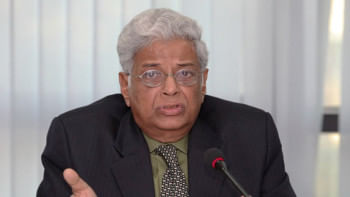Watchdog, new laws not needed

It's a complete failure of the government agencies -- they have portrayed inefficiencies in almost every step.
There is no need to form a separate regulatory body for the e-commerce sector as the existing legal framework is sufficient to ensure discipline, said industry stakeholders yesterday.
The capacity of the Directorate of National Consumers' Right Protection (DNCRP), the state agency responsible for hearing and addressing consumer complaints about goods and services, needs to be enhanced to weed out deceitful practices in the sector, said AKM Fahim Mashroor, chief executive officer of Bdjobs.com and AjkerDeal.
"We do not want a new regulatory body for e-commerce. The DNCRP needs to be made more effective -- it needs to enforce the regulations strictly. It is time to hold the organisation accountable."
Mashroor's comment came at a webinar organised by the Centre for Policy Dialogue styled 'Challenges in the E-commerce sector: What should be done?'.
The central bank also has a big role to play in ensuring that consumers were not duped as the advance payments to e-commerce companies are made through the payment gateways.
There are transaction records available, which could have been utilised to detect foul play.
"But they have failed. These incidents have taken place right in front of the eyes of the Bangladesh Bank. Their negligence was obvious," said Mashroor, one of the pioneers of the country's e-commerce sector.
"It's a complete failure of the government agencies -- they have portrayed inefficiencies in almost every step," said Tanjib-ul Alam, head of chamber at Tanjib Alam & Associates.
Were the institutional capacity of the agencies robust enough and their integrity upheld, the current storm over the e-commerce sector would not have brewed.
The biggest capacity and leadership failure came from the Bangladesh Financial Intelligence Unit (BFIU), he said.
After a newspaper report in August last year unveiled that Evaly's business model was akin to a Ponzi scheme and multi-level marketing model company, the BFIU had suspended the company's transactions for a month citing the money laundering prevision law.
Using that law, the BFIU could have extended the suspension and taken legal action against Evaly, Alam said.
But the BFIU did no such thing, which led the common people to believe that Evaly's business practices were fine as the authority responsible for overseeing transactions found nothing wrong after scrutinising them.
"That time, I thought Mohammad Rassel, the CEO of Evaly, would face legal action. But to my surprise, he turned the crisis into opportunity. The BFIU efficiently handed him the opportunity and he continued his business with multiple times the agility."
Then, he started spending money collected from the general people recklessly, sponsoring the Bangladesh Cricket Board series, the movie of Rapid Action Battalion, appointing celebrities as brand ambassadors and providing advertisements to media.
Evaly made further inroads when it became a sponsor of the Bangabandhu Innovation Grant 2021, a competition of the iDEA Project of Bangladesh Computer Council under the ICT Division, and the e-Commerce Movers Award 2020.
This gave the company validation, buttressing the positive impression in the general public's mind, according to Alam.
There were several occasions when the Bangladesh Competition Commission should have taken prompt action under competition law.
"But, they haven't done it. There were thousands of complaints filed at the DNCRP, but the institution did not have the capacity to handle this avalanche of complaints. They failed to take an institutional step," Alam added.
The e-Commerce Association of Bangladesh (e-CAB), the sector's trade body, had tipped off the authorities on the risky models of many e-commerce companies but no action was taken due to lack of coordination between monitoring institutions, said Muhammad Abdul Wahed Tomal, its general secretary.
"In Bangladesh, wherever we face any crisis, we all try to indicate that the crisis took place due to lack of adequate laws to prevent it," Alam said.
In a similar vein, after the e-commerce scams unfolded, there are propositions for new laws to regulate the sector.
"But that would derail the growth of the good players in the sectors. There is no need for new laws as existing laws are enough to prevent the irregularities in the sector," he added.
There is no separate regulatory body to regulate e-commerce in a country like the US, said Waseem Alim, CEO of Chaldal.com, an online supermarket that saw dizzying growth amid the pandemic.
"This will make e-commerce more difficult."
It will be more effective to increase surveillance through the existing agencies of the government, he said.
"We have built the trust of customers over the years and the ongoing incidents have dealt a blow to us. We have been facing difficulty in adding new customers in the last few weeks," Alim added.
There are also questions about the role of banks as they allowed payment to e-commerce companies against whom there has been a deluge of customer complaints of unfulfilled orders for a while now, according to Mashroor.
The recent fraudulent e-commerce businesses seem to have turned into investment schemes for some people and this should have been intervened earlier, said Selim RF Hussain, CEO of BRAC Bank.
He also pointed out that there is a lack of coordination among relevant stakeholders, giving a boost to the scammers to wreak havoc on the sector.
Unemployment is a big problem in the country, Mashroor said.
"Numerous young people are unemployed -- and frustrated. The bank interest rates are low and the stock market is not safe either. So where the youth will go for income?"
Naturally, they would gravitate towards the fast-growing e-commerce sector.
"It's wrong if you think that just forming a regulatory body would take care of all the problems," Mashroor added.
Meanwhile, for recovering the customers' money, Alam recommended the victims file a wind-up petition in High Court under section 241 of company law.
"Then, the court can appoint a provisional liquidator or administrator who will take the charge of the company and start the process of recovering money."
Later, the recovered money will be distributed among victims proportionately and the victims should abandon the hope of getting back all of their money as a big amount of it has already been spent recklessly.
It would be unconstitutional to compensate those victims by the government for taxpayers' money, Alam said.
"It will also stimulate future scams by giving a notion whatever happened the government will take care of," he added.
Rehman Sobhan, chairman of CPD, said he is very impressed that the e-commerce industry has a host of young entrepreneurs and the current events should not derail the growth of entrepreneurship in the sector.
"This is essentially an outlier of the system. This is a scam -- it's not inherited in the system. And this is not the first scam that has taken place."
Scams mostly originate from regulatory failures.
"It's a governance problem. It's a question of how you enforce the laws."
In all the big scams, the parties tend to mingle with policymakers to wriggle into their good books and get protection, he added.
The e-commerce sector has a huge potential for job creation and economic growth, said Fahmida Khatun, executive director of the CPD.

 For all latest news, follow The Daily Star's Google News channel.
For all latest news, follow The Daily Star's Google News channel. 



Comments